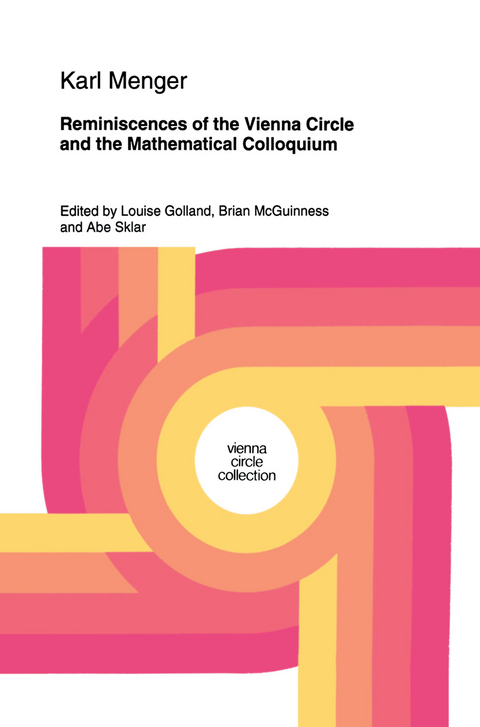
Reminiscences of the Vienna Circle and the Mathematical Colloquium
Seiten
1994
Springer (Verlag)
978-0-7923-2711-0 (ISBN)
Springer (Verlag)
978-0-7923-2711-0 (ISBN)
Karl Menger (1902-1985), a pure mathematician, also took an active interest in both philosophy and economics. In this memoir, he relates how these subjects developed against the Viennese background, and describes his membership of the Vienna Circle and of the Mathematical Colloquium.
Karl Menger was born in Vienna on January 13, 1902, the only child of two gifted parents. His mother Hermione, nee Andermann (1870-1922), in addition to her musical abilities, wrote and published short stories and novelettes, while his father Carl (1840-1921) was the noted Austrian economist, one of the founders of marginal utility theory. A highly cultured man, and a liberal rationalist in the nine teenth century sense, the elder Menger had witnessed the defeat and humiliation of the old Austrian empire by Bismarck's Prussia, and the subsequent establishment under Prussian leadership of a militaristic, mystically nationalistic, state-capitalist German empire - in effect, the first modern "military-industrial complex. " These events helped frame in him a set of attitudes that he later transmitted to his son, and which included an appreciation of cultural attainments and tolerance and respect for cultural differences, com bined with a deep suspicion of rabid nationalism, particularly the German variety. Also a fascination with structure, whether artistic, scientific, philosophical, or theological, but a rejection of any aura of mysticism or mumbo-jumbo accompanying such structure. Thus the son remarked at least once that the archangels' chant that begins the Prolog im Himmel in Goethe's Faust was perhaps the most viii INTRODUCTION beautiful thing in the German language "but of course it doesn't mean anything.
Karl Menger was born in Vienna on January 13, 1902, the only child of two gifted parents. His mother Hermione, nee Andermann (1870-1922), in addition to her musical abilities, wrote and published short stories and novelettes, while his father Carl (1840-1921) was the noted Austrian economist, one of the founders of marginal utility theory. A highly cultured man, and a liberal rationalist in the nine teenth century sense, the elder Menger had witnessed the defeat and humiliation of the old Austrian empire by Bismarck's Prussia, and the subsequent establishment under Prussian leadership of a militaristic, mystically nationalistic, state-capitalist German empire - in effect, the first modern "military-industrial complex. " These events helped frame in him a set of attitudes that he later transmitted to his son, and which included an appreciation of cultural attainments and tolerance and respect for cultural differences, com bined with a deep suspicion of rabid nationalism, particularly the German variety. Also a fascination with structure, whether artistic, scientific, philosophical, or theological, but a rejection of any aura of mysticism or mumbo-jumbo accompanying such structure. Thus the son remarked at least once that the archangels' chant that begins the Prolog im Himmel in Goethe's Faust was perhaps the most viii INTRODUCTION beautiful thing in the German language "but of course it doesn't mean anything.
I The Historical Background.- II The Cultural Background.- III The Philosophical Atmosphere in Vienna.- IV Why the Circle invited me. The Theory of Curves and Dimension Theory.- V Vignettes of the Members of the Circle in 1927.- VI Reminiscences of the Wittgenstein Family.- VII Ludwig Wittgenstein’s Austrian Dictionary.- VIII Wittgenstein’s Tractatus and the Early Circle.- IX On the Communication of Metaphysical Ideas. Wittgenstein’s Ontology.- X Wittgenstein, Brower, and the Circle.- XI Discussions in the Circle 1927–30.- XII Poland and the Vienna Circle.- XIII The United States 1930–31.- XIV Discussions in the Circle 1931–34.- XV The Circle on Ethics.- XVI Moritz Schlick’s Final Years.- Memories of Kurt Gödel.- Index of Names.
| Erscheint lt. Verlag | 30.6.1994 |
|---|---|
| Reihe/Serie | Vienna Circle Collection ; 20 |
| Zusatzinfo | XXVI, 244 p. |
| Verlagsort | Dordrecht |
| Sprache | englisch |
| Maße | 155 x 235 mm |
| Themenwelt | Geschichte ► Teilgebiete der Geschichte ► Kulturgeschichte |
| Mathematik / Informatik ► Mathematik ► Geschichte der Mathematik | |
| ISBN-10 | 0-7923-2711-X / 079232711X |
| ISBN-13 | 978-0-7923-2711-0 / 9780792327110 |
| Zustand | Neuware |
| Haben Sie eine Frage zum Produkt? |
Mehr entdecken
aus dem Bereich
aus dem Bereich
der stille Abschied vom bäuerlichen Leben in Deutschland
Buch | Hardcover (2023)
C.H.Beck (Verlag)
23,00 €
vom Mittelalter bis zur Gegenwart
Buch | Softcover (2024)
C.H.Beck (Verlag)
12,00 €
Die Revolution des Gemeinen Mannes
Buch | Softcover (2024)
C.H.Beck (Verlag)
12,00 €


